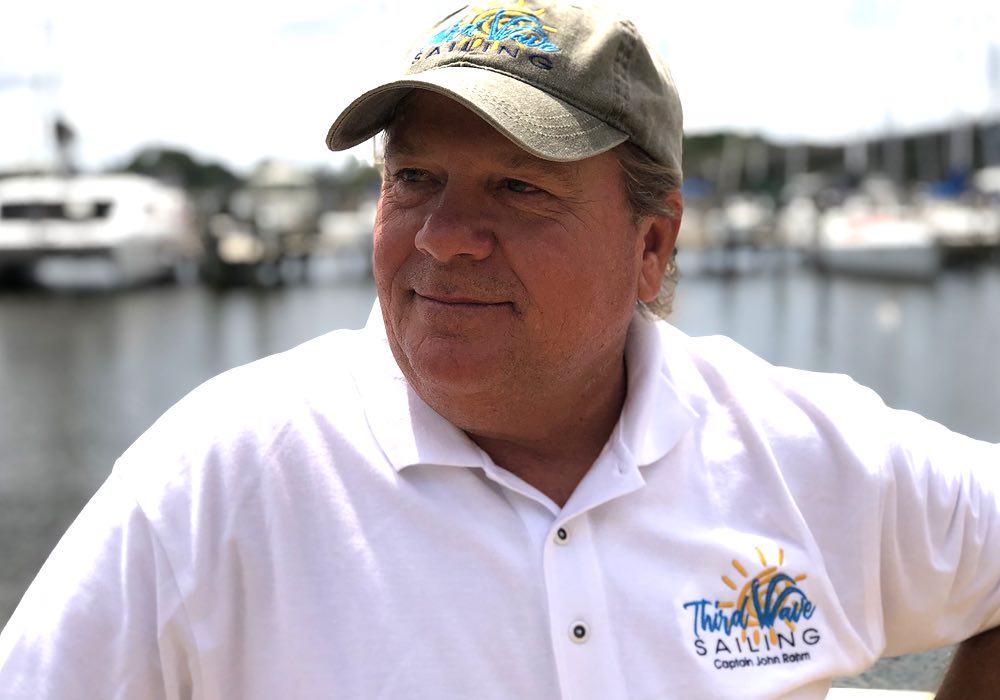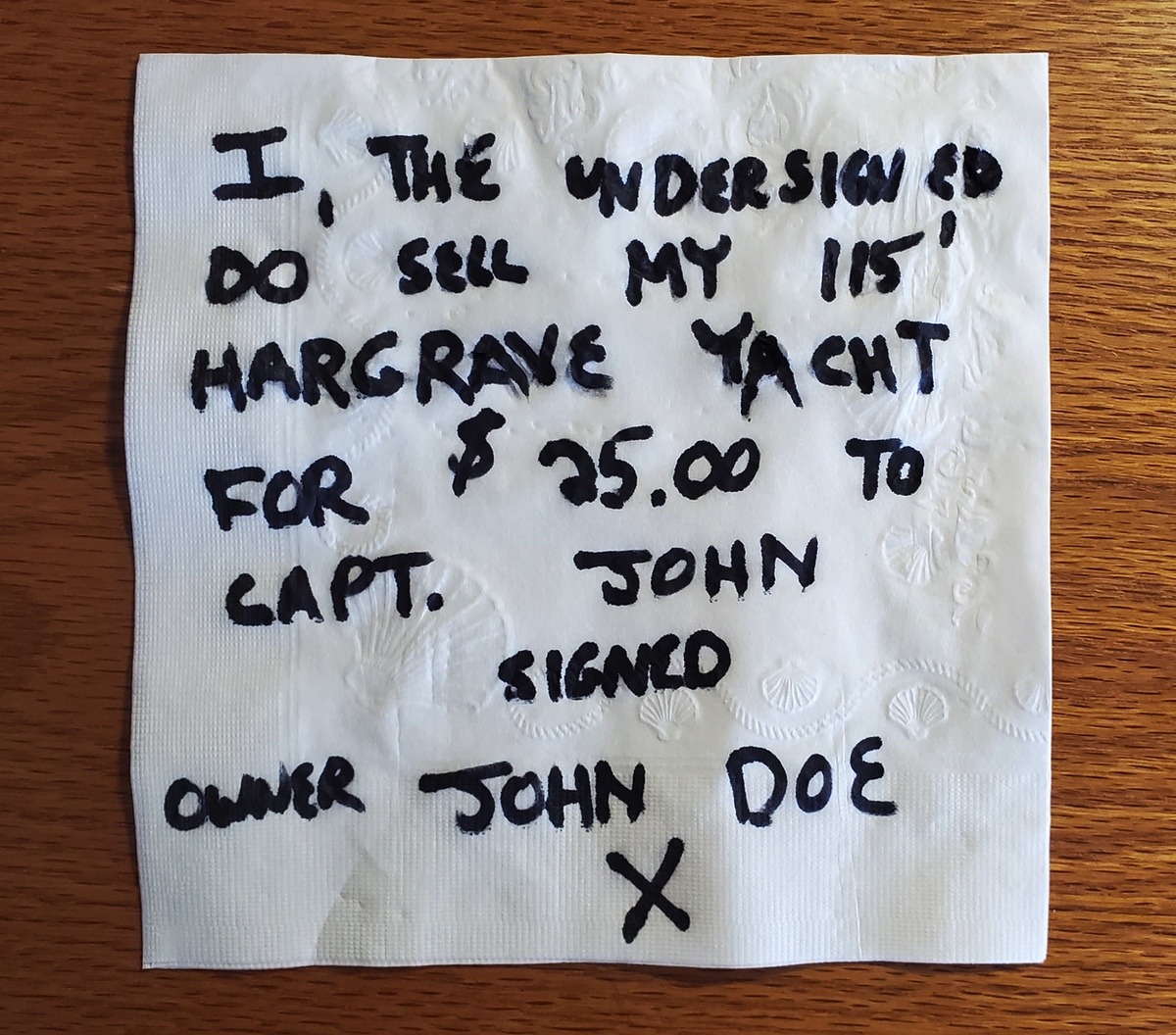It's Friday December 12, 2025

June 2021
To document, or not to document: that is the question. Whether ’tis nobler in the mind to suffer the slings and arrows of outrageous documentation or take up arms against a sea of paperwork…
No, it’s not Shakespeare’s Hamlet from 1601; but a relevant question in 2021.As I help new owners enjoy their boats, I get the documentation question a lot. The question is easily asked, but not easily answered. To understand the decision, owners must start at the beginning.
In the beginning…
There are two ways of proving ownership: documentation or titling. I use the word ‘or’ intentionally. Boat owners are not supposed to have both a title and documentation for the same vessel. The two are supposed to be mutually exclusive. Similar to vehicles, titles are issued by the state.
Documentation, on the other hand, is a federal process and administered by the United States Coast Guard (USCG) via their National Vessel Documentation Center. The center is located in Falling Waters, West Virginia thanks to Senator Robert Byrd who was a US Senator for 51 years. (Interesting, but not relevant.)

Documentation is a national form of boat registration. It is one of the oldest functions of Government, dating back to the 11th Act of the First Congress. It is one-stop shopping and is most helpful in establishing a chain of ownership.
• If your boat is brand new and never documented, to obtain initial documentation, you will need a Builder’s Certification, naming yourself as the person for whom the vessel was built or to whom the vessel was first transferred (from the builder). Also acceptable is a transfer on a Manufacturer’s Certificate of Origin, a copy of the State Registration or Title, or foreign registration showing you own the vessel.
• To document a previously documented vessel labeled exchange, return or re-instatement, you will need a USCG-1340 bill of sale or other evidence showing transfer of the vessel from the seller who last documented the vessel.
• To document a previously owned, undocumented vessel you will need a USCG-1340 bill of sale, or other evidence showing transfer of the vessel from the seller who last titled, or registered the vessel, or to whom the vessel was transferred on a Builder’s Certification or Manufacturer’s Certificate of Origin.
Disclaimer: I have skimmed the surface on these situations and recommend a visit to the USCG website for more details about requirements.
If you bought a boat using the clean side of a Silo’s restaurant napkin, I recommend you contact the National Vessel Documentation Center at 304 271-2400 or nvdc.w.webmaster@uscg.mil. You are going to need a lot of help.
The Silos Napkin Bill of Sale.When vessel ownership is being transferred, it is wise to get all the compulsory information the Documentation Center has about the boat. This information is called an USCG Abstract of Title or as slang, ‘Abstract’.
The Abstract of Title is the record of all the information submitted to the USCG for a particular vessel. Name, documentation number, liens and mortgages, and name changes are just some of the information found on an Abstract of Title.
An Abstract can produce a lot of information about the boat history. If the previous owner had an unsettled debt, the lender, who knows the documentation number, might file a lien against the boat to inhibit any handovers or sales until the statement is satisfied. Heads up: any unpaid claim attached to the vessel will become your responsibility as the new owner. The USCG Abstract of Title is worth every cent of the $25 fee.
Heads up, again: there are private vessel documentation services that look governmental and charge more for their services. These services have paid for Google for priorities and often appear first in Internet searches. Be sure you are on the USCG site. Google “USCG Vessel Documentation Center” for proof.
Anyway.
If your boat is documented, you are on firm ground. The Coasties will not issue new documentation unless all the liens have been satisfied. Titling can be more problematic. Read on.
The North Carolina Wildlife Resources Commission is legally responsible for vessel titling in North Carolina. It also protects the interests of financial institutions or individuals that provide loans on vessels. Lenders most often require that a vessel be titled as a condition for granting a loan.
The Wildlife Commission keeps computerized records on all titled vessels, and issues Title Certificates which identify the owner of a vessel and any liens that lenders choose to record on the Title Certificate.
A title is available to any North Carolina vessel owner, provided that the vessel is registered in North Carolina; is not simultaneously titled in any other state; and is not documented with the U.S. Coast Guard. At the time of applying for a North Carolina title, any existing out-of-state title must be surrendered to the Wildlife Service Agent or mailed to the Wildlife Commission.
Titling adds the owner’s name, address, and vessel description to the records of the NC Wildlife Commission. It also records the names and addresses of lien holders against the vessel.
If a title is issued showing a lien holder, when the associated loan is paid off the lien holder should sign and notarize the Title Certificate to release the lien, and then mail the Title Certificate to the vessel owner.

Just like a vehicle, when an owner desires to sell a titled vessel, the ‘Assignment of Title’ section of the Title Certificate is filled out. The purchaser is named, the owner signs the form and has the signature notarized. The Title Certificate is then given to the purchaser. The purchaser, the boat dealer, or the Wildlife Service Agent must turn in the previous owner’s Title Certificate to the Wildlife Commission to apply for transfer of ownership. This must be done even if the title is from another state.
The NC Wildlife Service Agents for vessels in Pamlico County are: Village Hardware, Forrest Farm Supply, Neuse River Bait and Tackle and the Alliance License Plate Agency. Wal-Mart and Pamlico Home Builders are also Wildlife Service Agents; but, not for vessels.
“So Captain John, I’ve read 1025 words. What’s the issue?” Here’s the issue highlighted by a true story: A documented boat has a recorded lien/mortgage. The documentation expires. The owner then titles the boat with the state (lien not recorded) and later sells the boat via title transfer. The new owner learns he/she has also bought a huge amount of debt when they apply for ownership by attempting reinstate the documentation. (Ouch)
I am saying that sometimes liens “drop through the cracks” when boats are titled, particularly when titles are transferred between states. Boats get titled over many years up and down the east coast with the lien laying dormant in the expired documentation. Most often it is not sinister. The most common headache happens when the lender does not properly file the satisfaction/release of mortgage/lien paperwork with the state or USCG Documentation Center. Interestingly…
Some boat brokers will only sell documented boats that provide well established chain-of-ownerships. Boat brokers live in this paperwork swamp. They are knowledgeable and can help you navigate this process.
So, now with this bit of knowledge you can exercise an appropriate measure of diligence. Do you own all of your boat? And, are you sure? If you have documentation, you are free from the previous owner’s financial attachments.
Perhaps next month a few words on registration.
Fair Winds,
Captain John RahmAuthor disclaimer: Words matter. Therefore, in order to get my words more exact, I have used a lot of the USCG National Vessel Documentation Center and NC Department of Wildlife website verbiage. I credit them and highly recommend a visit to those sites to learn more.
Related Links • NC Department of Wildlife
Captain's Blog on TownDock.net is all about making your time on the water enjoyable. Captain John Rahm teaches sailing and boat handling at Third Wave Sailing.



